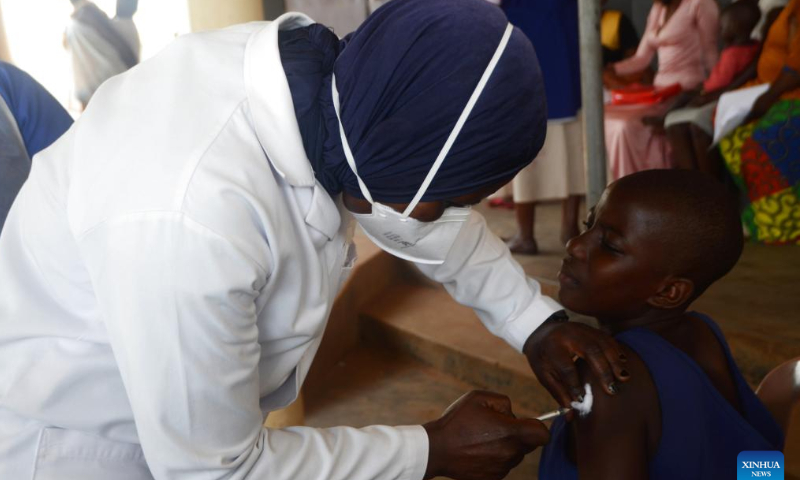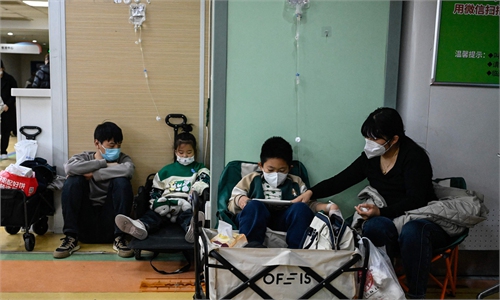'Disease X' highlighted in Davos meeting; experts say strengthened intl collaboration essential for combating common enemy

A health worker immunizes a girl with a Human Papilloma Virus vaccine during a World Cancer Day event in Mukono, Uganda, Feb. 4, 2023. Hundreds of people on Saturday turned up for free cancer screening during an event to mark World Cancer Day in the central Ugandan district of Mukono.Photo: Xinhua
While leaders from across the globe gathered at the annual meeting of the World Economic Forum in Davos, Switzerland to discuss "Disease X" - an imaginary virus that is hypothetically 20 times more lethal than COVID-19, Chinese experts called for strengthened international collaboration, recognizing such collaboration as the pivotal element in the global fight against the shared adversary.
We should get prepared for "Disease X," the World Health Organization (WHO) secretary-general Tedros Adhanom Ghebreyesus warned during a panel discussion entitled "Preparing for Disease X" on Wednesday local time in hope of countries reaching an agreement by the coming May to address this unknown but common enemy.
"Because this is about a common enemy and without a shared response, starting from the preparedness ... we will face the same problem as COVID," the WHO chief said.
Wei Sheng from the School of Public Health and Emergency Management at Southern University of Science and Technology told the Global Times that the establishment of the "X" pathogen by the WHO aims to draw global attention to the highly unknown, highly harmful, and highly probable potential outbreaks of infectious diseases.
During the COVID-19 pandemic, it was evident that global cooperation and communication within the WHO framework were greatly disrupted, making information sharing and resource coordination increasingly difficult, Wei noted, saying that the establishment of the "X" disease by the WHO can be seen as an effort to strengthen global cooperation, but its effectiveness remains to be observed.
In its efforts to address potential global pandemics, the WHO has designated "Disease X" as a significant disease in its awareness campaigns. "Disease X" is ranked alongside other prominent diseases such as COVID-19, Ebola virus, Zika virus, Crimean-Congo haemorrhagic fever, Middle East Respiratory Syndrome, and Severe Acute Respiratory Syndrome (SARS). The WHO included "Disease X" in 2018 to initiate discussions on effectively combating a worldwide pandemic in the future, media reports showed.
Regarding the concern of the WHO about the emergence of the "X" pathogen, Wei believes that looking into the future and considering the development patterns of viruses, it is not only possible for a virus like "Disease X" to emerge, but also highly likely. "Once this virus strikes, it is very likely to completely surpass our current level of understanding, just like the initial appearance of the novel coronavirus."
UK media outlet the Independent citing Thomas Russo, an infectious diseases expert from the University of Buffalo Jacobs School of Medicine and Biomedical Sciences, warned that "Disease X" could also turn out to be a brand new pathogen not yet known even among animals.
"As mankind breaks down these barriers [between humans and other species] through live animal markets and deforestation, we need continued surveillance and studies and improved biosecurity across the world," Russo was quoted as saying.
Wei believed that the "X" pathogen is likely to be a respiratory transmitted virus that spreads through respiratory droplets or aerosols, as this type of virus is more likely to cause widespread transmission.
It is currently difficult to have specific means to reduce the probability of infectious diseases, but we can be proactive to improve our response capabilities, Wei noted, for example, establishing a monitoring network that covers the entire process of pathogen transmission from animals to humans, further strengthening high-level detection and identification methods, enhancing the capacity of disease control and prevention teams, increasing the availability of rapidly mobilizable medical resources, and enhancing the ability for rapid development of vaccines and drugs.
"These measures need to be consistently implemented in the long term and should not be temporary measures taken only when a crisis occurs," said Wei.
A Chinese public health expert also emphasized to the Global Times on condition of anonymity that in the long run, strengthened international communication and cooperation will be the essential foundation for combating "Disease X."



